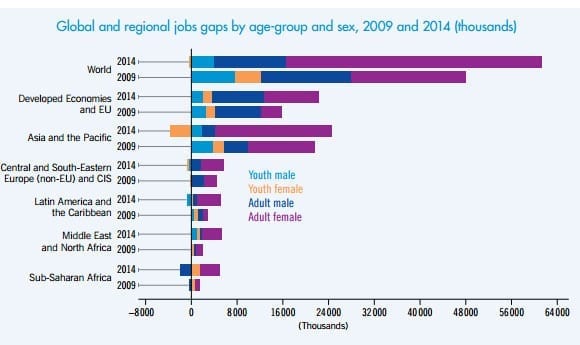
May 19, 2015
More than 60 percent of workers worldwide, predominantly women, are in temporary, part-time or short-term jobs in which wages are falling, a growing trend that is fueling global income inequality and poverty, according to an International Labor Organization (ILO) report released today.
“This report reveals a shift away from the standard employment model, in which workers earn wages and salaries in a dependent employment relationship vis-à-vis their employers, have stable jobs and work full time,” the report states. Further, “labor incomes constitute the main source of income inequality.”
Although the incomes of permanent workers are relatively stable, the percentage of such workers is declining globally—and as few as 20 percent of workers are in permanent jobs in regions such as sub-Saharan Africa and South Asia. Many of these precarious jobs are in the informal economy, which includes market vendors, day laborers, pedicab drivers and domestic workers. In fact, domestic workers, most of whom are women, represent 3.6 percent of wage employment worldwide, the report says.
“World Employment and Social Outlook: The Changing Nature of Jobs” cites a shortage in global aggregate demand as a potentially key factor in explaining the slow growth of decent jobs, which has created a global jobs gap that costs an estimated $1.218 trillion in lost wages for workers around the world. The ILO estimates that 201 million women and men were out of work in 2014, more than 30 million higher than before the start of the 2008 global economic crisis.
“A vicious circle may be at work, with lower demand affecting output and employment, thereby further depressing demand,” the report states. In other words, fewer jobs and lower wages mean workers and their families will be able to purchase less, and so fewer jobs will be created and low-pay will be the norm, a vicious cycle that can only be broken by large-scale job creation and incomes that sustain working people and their families.
Workers making low pay are less likely to be union members or to benefit from collective bargaining, according to the report. Further, despite widespread unemployment, in particular among women, there is very limited social protection for unemployed working-age adults. The report recommends policy changes that address the transformation in employment structures and include the growing numbers of precarious workers in social protection systems.
The report also notes that approximately 1 in 5 workers contribute to global supply chains, which “facilitates transitions to the formal economy and waged employment for many workers.” However, the study equally highlights that the vast majority of employment in the global supply chain takes place under poor working conditions. This is particularly the case for vulnerable workers, such as unskilled women, youth and migrant workers.
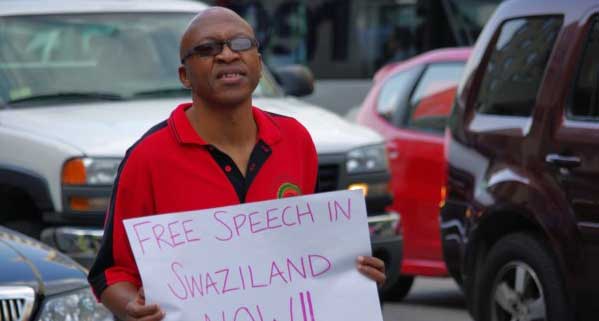
May 16, 2015
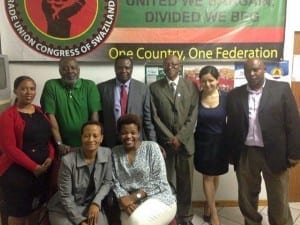
AFL-CIO Metropolitan Washington Labor Council President Jos Williams (green shirt) is part of an international union delegation to Swaziland. Credit: STAWU
An international delegation of union leaders traveling in Swaziland is calling on the government to guarantee the rights of workers to freely form unions and exercise freedom of speech and assembly, and says repressive legislation used by police against union activities still has not been addressed by Parliament, even as the government continues to imprison human rights activists for exercising their right to freedom of speech.
Led by Wellington Chibebe, International Trade Union Confederation (ITUC) deputy general secretary, the fact-finding group is looking into the ongoing government repression directed at Swazi union leaders and human rights proponents, and plans to issue a report to the ITUC and to several members of the European Parliament by the end of May.
Just days before the delegation arrived on May 14, the Swaziland government announced it had registered the Trade Union Congress of Swaziland (TUCOSWA), an action it has refused to take for the past three years.
But delegation members say they are not celebrating the action because the government “did not do more than it was supposed to do,” says Jos Williams, president of the AFL-CIO Metropolitan Washington Labor Council, speaking from Swaziland. “We do not see that as a victory of any kind.” Williams is among a six-member delegation that includes a representative from the Congress of South Africa Trade Unions (COSATU).
In fact, two days after the government announced TUCOSWA’s official registration, police massed outside a meeting of TUCOSWA affiliates in a show of force, according to TUCOSWA Secretary-General Vincent Ncongwane.
“All that has been told (by the government) to the world is just playing to the public gallery,” Ncongwane says, while the reality of repression in a monarchical government that outlaws political parties continues. Twice this year, police have broken up TUCOSWA union meetings, injuring a union leader in the process. On May Day, brave union members held rallies despite a government ban on public gatherings.
The ITUC is demanding the government repeal anti-terrorism laws that enable it to imprison union leaders and others who call for democracy; provide full recognition of union activities in accordance with international laws; and support freedom of speech, assembly and association.
“The government must meet the demands the ITUC delegation has made if the ITUC is to give a favorable report by the end of the month,” Williams says. “From my standpoint, the actions of the government have not been very encouraging. Yes, they have recognized the union, but regarding the other demands we made, there has been no response.”
Delegation members also sought to visit political prisoners, some of whom have been held for two years. So far, says Williams, they “have gotten the run-around” in efforts “to see our comrades in jail and look at the conditions.” (You can sign a LaborStart petition demanding their release. If you Tweet, use the hashtag #SwaziJustice.)
In June 2014, the U.S. government took the rare step of suspending African Growth and Opportunity Act (AGOA) trade benefits for Swaziland, citing the Swazi government’s systematic violations of fundamental worker rights, including refusal to legally recognize TUCOSWA. In addition, the 2014 U.S. State Department human rights report cited serious human rights violations in Swaziland, including arbitrary or unlawful killings by the government or its agents and severely restricted freedom of assembly, including violence against protestors.
Given the level of harassment and repression, Williams says he “came here seeking to encourage” union leaders, but instead found that “they are standing tall in the face of adversity.
“It is rewarding to me as a trade unionist to have drawn strength from these individuals.”
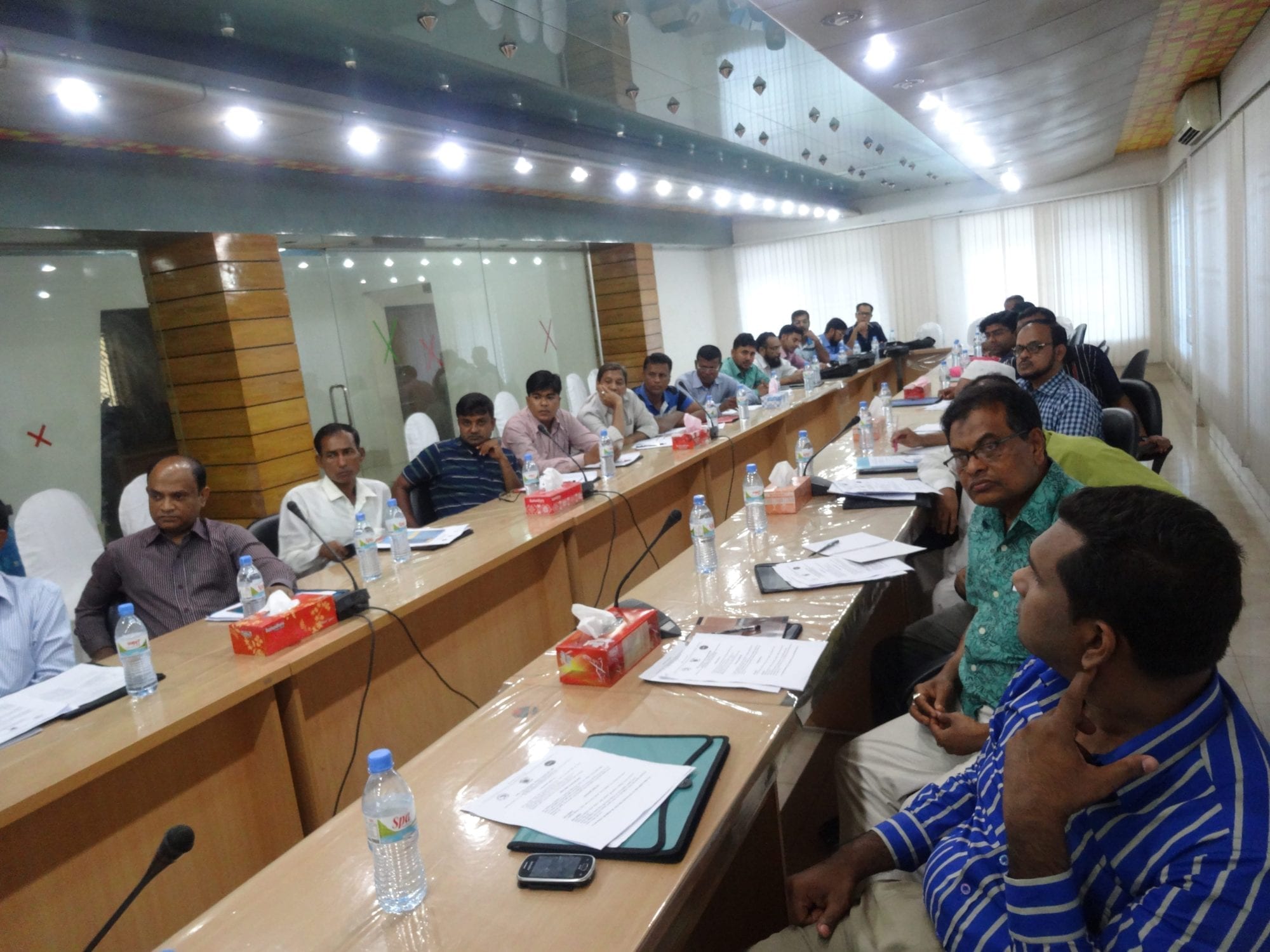
May 14, 2015
Bangladesh shrimp industry owners, management officials and labor and human rights activists discussed and debated the dispute resolution process in the country’s shrimp industry at a recent workshop organized by the Solidarity Center, the Bangladesh Frozen Foods Exporters Association (BFFEA) and Bangladesh Shrimp and Fish Foundation (BSFF).
The alternative dispute resolution process was instigated in 2013 when BFFEA, BSFF and the Solidarity Center signed a groundbreaking memorandum of agreement (MoA).
Under the MoA, shrimp industry owners and managers agreed to implement worker rights according to Bangladesh labor law and International Labor Organization (ILO) core labor standards and to give the nearly 1 million shrimp workers who toil during peak season across the supply chain the right to form trade unions.
Among the participants, who included production managers, compliance officers and managing directors, BFFEA Senior Vice President Golam Mostafa said he hoped the dispute resolution mechanism in the shrimp industry would be an example other industries will follow. Solidarity Center-Bangladesh’s MoA project consultant and former secretary of Bangladesh government AKM Zafar Ullah Khan said that alternative dispute resolution and participation committee is important for a sustainable shrimp sector.
Solidarity Center’s Bangladesh staff also addressed questions about pending cases, worker compensation and the overall process.
Alonzo Suson, Solidarity Center Bangladesh country program director, stressed the need for promotion, outreach and education to make workers aware of the alternative dispute resolution process. Suson praised the MoA and said he had heard that labor-management relationships were improving because of the joint initiative.
The Solidarity Center began working with Bangladeshi nongovernmental organizations in 2005 to look at ways to ensure the rights of shrimp workers are protected at the workplace. In 2012, the Solidarity Center issued its second in-depth report on the issue, “The Plight of Shrimp-Processing Workers of Southwestern Bangladesh.”
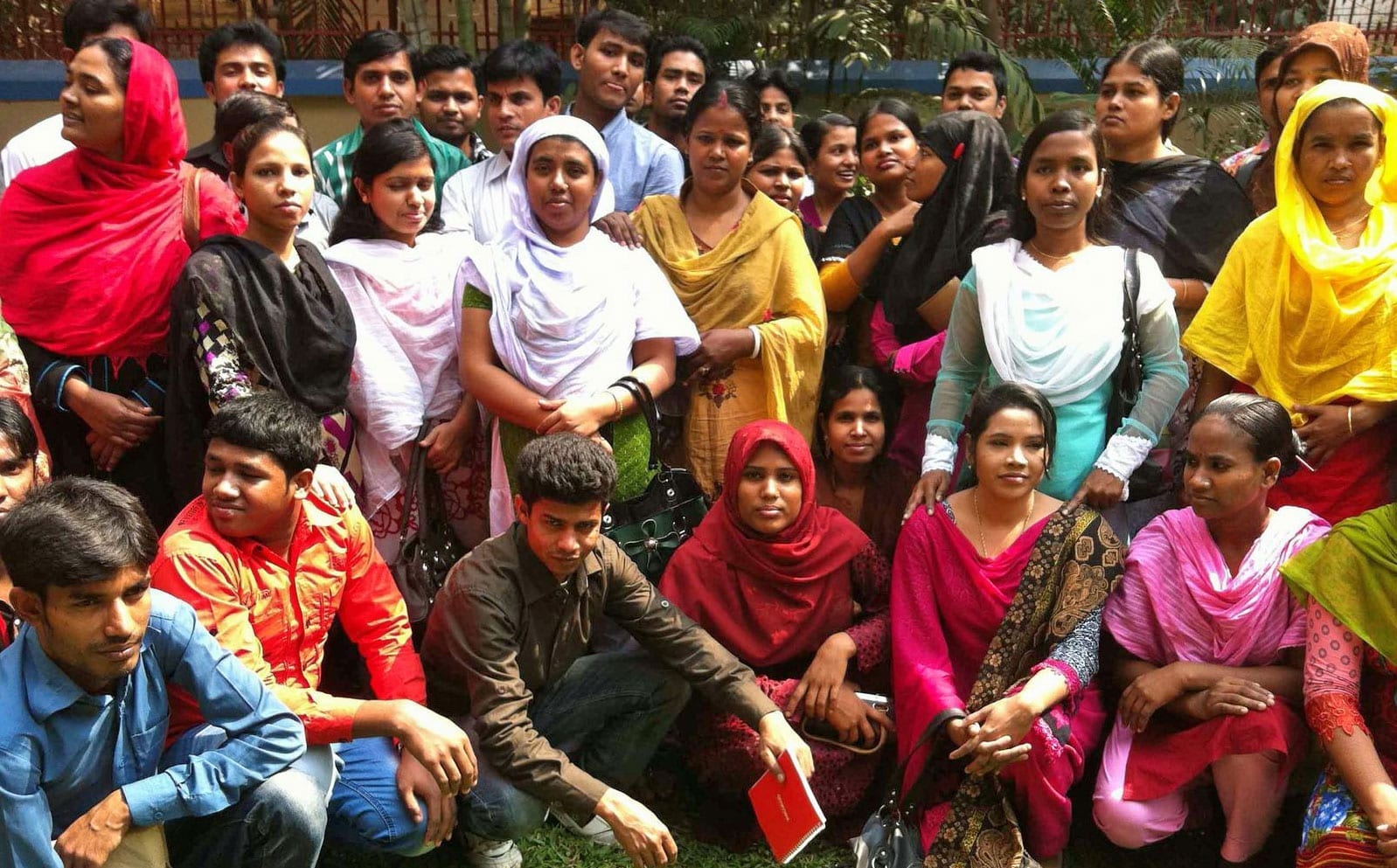
May 13, 2015
When a garment factory union organizer in Gazipur, Bangladesh, was beaten in April while meeting with workers about their nascent union, the Solidarity Center Bangladesh Worker Rights Defense Fund was there to help him cover the medical care he needed, an expense he otherwise could not have afforded.
The Solidarity Center launched the Bangladesh Worker Rights Defense Fund in April 2014, following an increase in violence and harassment against workers, many of them young women, who were seeking to form unions to protect their health, dignity and rights on the job. Donations of more than $15,500 over the last year from individuals and organizations have helped to provide costly medical treatment for organizers beaten or attacked while speaking to workers about their rights, and temporary food and shelter for workers fired for trying to improve their workplace.
Following the Rana Plaza collapse in April 2013 and other high-profile catastrophes, the Bangladesh government began recognizing worker rights and the country’s own labor laws, allowing workers to form representative unions. Garment workers have since established more than 300 factory-level unions and seen more than 15 collective bargaining agreements signed.
But in the past year, violence and retaliation against workers seeking safe workplaces, protection from sexual harassment and better-than-subsistence-level wages has escalated. “A severe climate of anti-union violence and impunity prevails in Bangladesh’s garment industry,” according to a March International Trade Union Confederation (ITUC) report. “The violence is frequently directed by factory management.”
When garment workers are allowed to form unions, they have the opportunity to create positive changes at their workplaces.
There’s still time to donate to the Bangladesh Worker Rights Defense Fund.
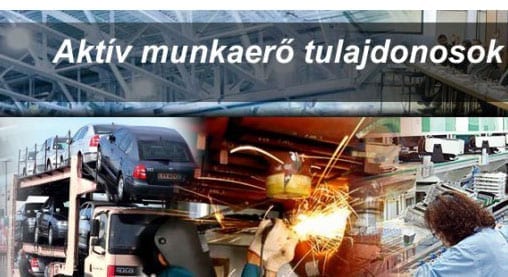
May 8, 2015
LabourStart has announced the following campaign. Take action here.
The Austrian-founded multinational transportation company Hödlmayr International AG is making the situation of trade union officials at its Hungarian subsidiary difficult while it intimidates employees who want to join the union.
The Trade Union of Workers of Multinational Companies (TUWMC) created its local organisation in 2013 with a membership rate of 50 percent to 60 percent. At the members’ initiative, TUWMC started to negotiate a collective agreement with the company. The negotiations were progressing well for two or three months, then were interrupted due to the employer’s behavior.
From that time, Hödlmayr hampered the work of several trade union officials. Most recently, they sacked the leader of the local organization, László Benkó, after he made a statement during a trial concerning the wage system. Benkó has worked for more than 20 years for the company and no objections had ever been raised concerning the quality of his work.
Click here to take action and demand that Hödlmayr give László Benkó his job back and come to an agreement with TUWMC on fair wages.






